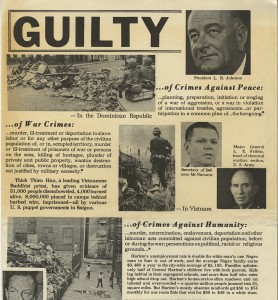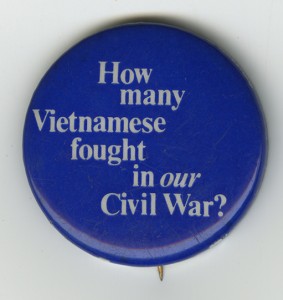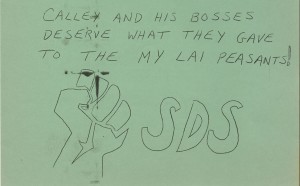
This handout published by the Progressive Labor Party accuses President Lyndon B. Johnson, Secretary of Defense Robert McNamara, and Major General L.E. Fellenz of being guilty of crimes against peace and humanity. The handout condemns the US government for crimes against civilians at home and abroad, crimes such as murder, deportation, and enslavement.
Antiwar activists believed that the war waged in Vietnam was immoral. Literature created by antiwar groups, such as this leaflet produced by the Progressive Labor Party, demonstrates protesters’ belief that politicians who supported the war were “guilty of crimes against peace, war crimes, and crimes against humanity.” Posters like these encouraged Americans to think critically about the war and question whether American activities in Vietnam were in line with national values of equality and justice.

This button offers a pointed criticism of the war. Framing the conflict in Vietnam as a civil war, it suggests that international intervention is uncalled for by questioning whether it is appropriate for one country to get involved in another nation’s internal conflict.
The Vietnam War originated as a Vietnamese fight against imperial rule and evolved into an internal conflict between the pro-communist North and the anti-communist South. This political button raises the question of whether or not the United States had a right to intervene in the conflict. Antiwar protesters believed doing so to be a violation of American values of self-determination and democracy. By invoking the American Civil War, antiwar activists reminded Americans of the intrastate roots of a conflict that was widely perceived as a global war between forces fighting for and against Communism.
Opposition to the draft was another major component of protest. Even though most college students could get deferments, many objected to the notion of being forced to fight in a war they did not agree with. Others believed the draft was undemocratic, racist, and classist due to the deferments that were mostly afforded to the more affluent. Even some conservative student groups like Young Americans for Freedom (YAF) enthusiastically supported the war but opposed the draft on the grounds that a volunteer army was more in line with the ideals of American freedom.

This flyer promotes a rally hosted by the Chicago Area chapter of Students for a Democratic Society. The organizers demanded justice for the South Vietnamese civilians murdered in the My Lai Massacre, accusing United States Lieutenant William Calley of murder. The students held a forum to discuss their plans for a citywide rally the following day.
Many student protesters were also enraged by reports of atrocities coming in from the front. While war crimes were committed by soldiers on both sides of the Vietnam War, students were particularly concerned with the actions of American soldiers. The My Lai Massacre on March 16, 1968, which resulted in the death of as many as 500 Vietnamese citizens at the hands of U.S. servicemen commanded by Lieutenant William Calley, was a shattering example of the brutality of the war and its impact on civilians. Some Americans, such as members of the activist group Students for a Democratic Society (SDS) who created this flier, blamed the massacre on U.S. imperialism and racism, drawing attention to the way that the US military’s body count strategy produced a lack of regard for Vietnamese lives. Others blamed it on the day-to-day stresses of war and the ever-present danger of living in a war zone. Yet, regardless of how they interpreted the events at My Lai, reports of atrocity from the front played an important role in prompting many Americans to question the war.
